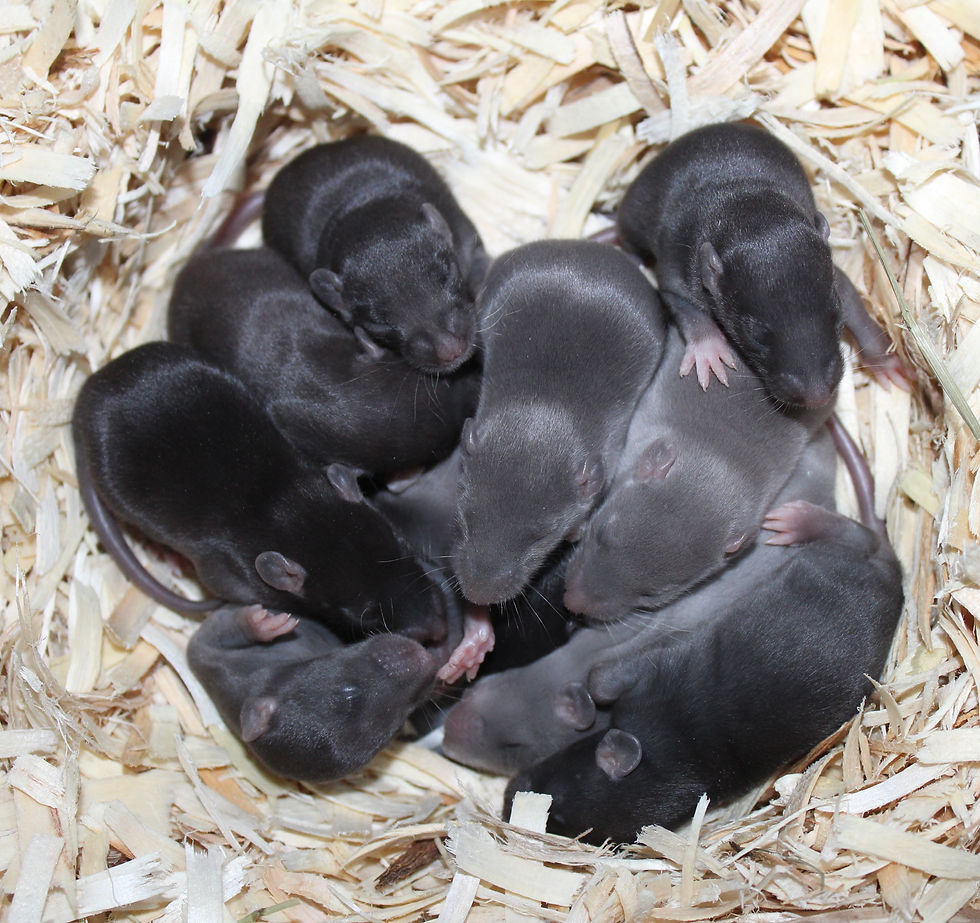How to Ensure Responsible Rat Breeding: Why Professionals Should Take the Lead
- StormHaven Rattery

- Jun 10, 2025
- 3 min read
Updated: Aug 29, 2025

Breeding rats can be an exciting endeavor for enthusiasts and a rewarding hobby for many. However, the challenges and responsibilities that come with rat breeding are often underestimated. This post emphasizes the importance of leaving rat breeding to professionals who have the expertise, resources, and ethical commitment necessary for the welfare of these intelligent animals.
Understanding Rat Breeding
Breeding domestic rats requires much more than simply pairing two animals. It involves a comprehensive understanding of genetics, health, and social behaviors.
Professional breeders study genetic traits that can heavily influence the health and temperament of offspring. For instance, specific genes can result in hereditary conditions like respiratory issues or tumors, diminishing a rat's quality of life. A reputable rat breeder will conduct genetic testing to avoid producing litters that might be predisposed to such health concerns.
While it might be tempting for enthusiasts to breed their pets, the necessary knowledge is not something every rat owner possesses. An amateur approach may unintentionally introduce harmful traits or health problems, severely affecting the well-being of the rats involved.
The Importance of Health Screenings
Professional rat breeders employ comprehensive health screenings. This includes evaluating breeding rats for diseases, parasites, and genetic disorders. A study revealed that focused health screenings can decrease the incidence of common illnesses by nearly 30%.
Failing to conduct these screenings can result in breeding sick animals, perpetuating conditions that lead to suffering. Only informed professionals can guarantee that each rat selected for breeding is healthy, thus enhancing the overall quality of the breeding process.
Health encompasses emotional well-being too. Since rats are social animals, their mental health can significantly decline if bred under poor conditions. Professionals create environments that encourage social interaction, stimulating activities, and responsible pairings that nurture desirable traits.
Long-Term Responsibilities
Breeding rats involves a commitment that goes far beyond the act of mating. Every litter born comes with an ethical responsibility to provide care and a nurturing environment until they find loving homes.
Professionals fully grasp the commitment required to raise young rats to adoption age. This encompasses proper nutrition, healthcare, and regular monitoring of their interactions with each other and their surroundings. For example, some professional breeders may spend up to three months caring for a litter, ensuring they are well-adjusted before moving to their new homes.
In contrast, amateur breeding can lead to abandoned or poorly cared-for animals, exacerbating the overpopulation issue within the rat community. By confining breeding to professionals, the focus remains on long-term care and consideration for the animals’ futures.
Ethical Considerations
Ethics are vital in rat breeding. The well-being of the animals must be the priority. Professional breeders usually belong to larger communities that promote responsible breeding practices. They follow ethical guidelines that emphasize animal welfare, such as avoiding overbreeding and ensuring humane selling practices.
Conversely, amateur breeders may focus solely on profit and overlook these ethical concerns. This approach can result in a range of problems, including unhealthy animals and heightened stress levels in breeding pairs.
The Challenge of Finding Homes
One of the most underestimated challenges of rat breeding is securing suitable homes for the offspring. Professional breeders often have established networks of potential adopters who understand rat care and are ready for the responsibilities that lie ahead.
For example, a well-prepared breeder may have a list of vetted homes for each rat, ensuring that each one is placed in an environment that meets its unique needs and personality traits. In contrast, amateur breeders may lack the resources to effectively screen potential adopters, resulting in young rats being placed in unsuitable conditions, which can jeopardize their health and happiness.
Final Thoughts
The intricate world of rat breeding requires expertise that goes far beyond a simple love for these creatures. By entrusting breeding to knowledgeable professionals, rat owners can help ensure a safe, healthy, and ethical breeding process.
The advantages that trained breeders offer—such as a deep understanding of genetics, rigorous health screenings, ethical considerations, and a commitment to long-term care—are invaluable. Fostering a sustainable and loving environment for both the rats and their future homes can only be achieved through responsible practices that prioritize the animals’ needs above all else.



Comments